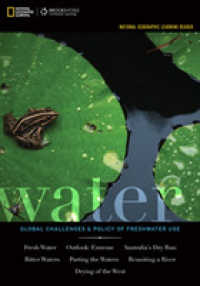Full Description
How did epidemics, zoos, German exiles, methamphetamine, disgruntled technicians, modern bureaucracy, museums, and whipping cream shape the emergence of modern neuroscience?
This history explores the exceptionally complex scientific and medical techniques and practices that have allowed practitioners to claim expertise in the brain and mind sciences over the past two centuries. Based on meticulous historical studies, essays in the volume move from the postrevolutionary Parisian Menagerie of the Jardin des Plantes to the political contexts of neuroscience within the National Institute of Mental Health in the United States in the late twentieth century. Touching on such disparate topics as the luggage of German exiles, the role of whipping cream in industrial food production, the emergence of neurosurgery, and the private musings of a disgruntled medicaltechnician, the contributors to this volume make a powerful case for concentrating scholarly attention on seemingly marginal chapters of the history of the mind and brain sciences. By so doing, the authors contend that it is in the obscure, peripheral, and marginal stories of the past that we can best see the emerging futures of the medicine and science of the brain and the mind. Collectively these essays thus reveal that the richness of the history of the brain and mind sciences cannot and should not be reduced to a unitary, uncomplicated narrative of progressive discovery.
CONTRIBUTORS: Brian P. Casey, Stephen T. Casper, Justin Garson, Delia Gavrus, Katja Guenther, L.Stephen Jacyna, Kenton Kroker, Thomas Schlich, Max Stadler, Frank W. Stahnisch Stephen Casper is Associate Professor of History at Clarkson University. Delia Gavrus is Assistant Professor of the History of Science at the University of Winnipeg.
Contents
Acknowledgments
Introduction - Delia Gavrus and Stephen T. Casper
1. "We Are Veritable Animals": The Nineteenth-Century Paris Menagerie as a Site for the Science of Intelligence - L. Stephen Jacyna
2. "Physiological Surgery": Laboratory Science as the Epistemic Basis of Modern Surgery (and Neurosurgery) - Thomas Schlich
3. Configuring Epidemic Encephalitis as a National and International Neurological Concern - Kenton Kroker
4. Circuits, Algae, and Whipped Cream: The Biophysics of Nerve, ca. 1930 - Max Stadler
5. Epilepsy and the Laboratory Technician: Technique in Histology and Fiction - Delia Gavrus
6. "What Was in Their Luggage?": German Refugee Neuroscientists, Migrating Technologies, and the Emergence of Interdisciplinary Research Networks in North America, 1933 to 1963 - Frank W. Stahnisch
7. Dualist Techniques for Materialist Imaginaries: Matter and Mind in the 1951 Festival of Britain - Stephen T. Casper
8. A "Model Schizophrenia": Amphetamine Psychosis and the Transformation of American Psychiatry - Justin Garson
9. Salvation through Reductionism: The National Institute of Mental Health and the Return to Biological Psychiatry - Brian P. Casey
Coda: Technique, Marginality, and History - Katja Guenther
Bibliography
List of Contributors
Index








